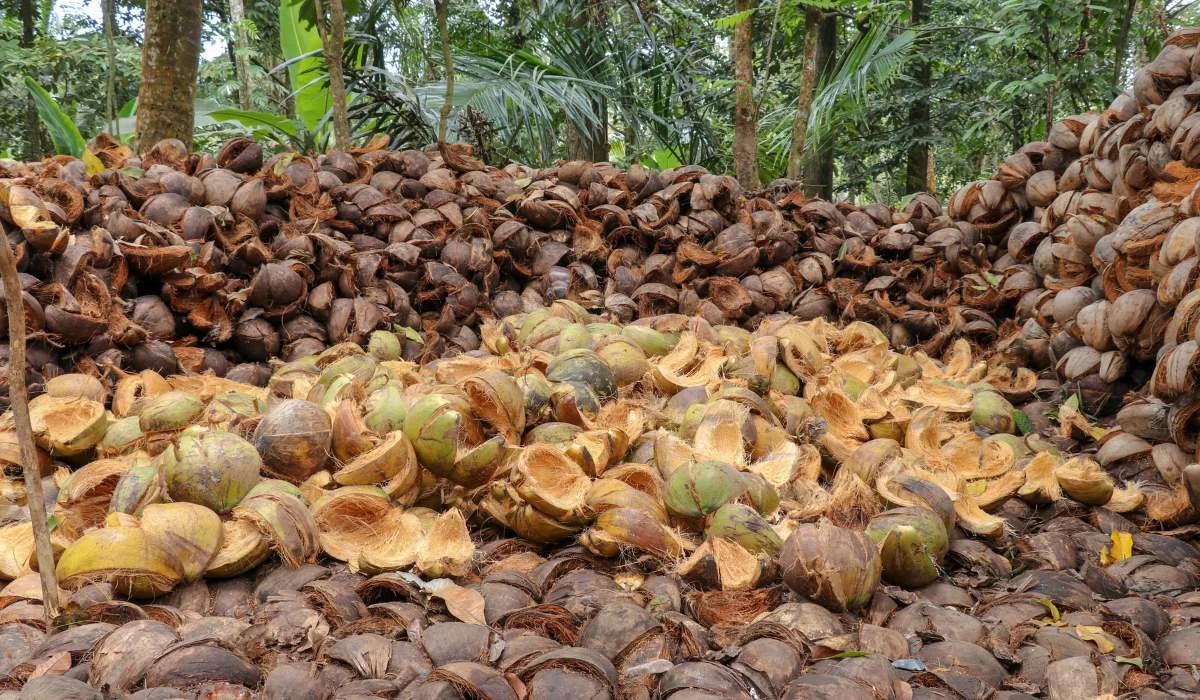Harnessing Sustainability: 10 Innovative Approaches to Coconut Waste Utilization. In a world that is increasingly embracing sustainable practices, the spotlight is now turning towards ingenious ways to utilize waste materials. One such overlooked resource is coconut waste – a byproduct of the coconut industry that, when harnessed correctly, can be transformed into a treasure trove of valuable products. This article explores the fascinating realm of Coconut Waste Utilization, delving into ten explanations that showcase its potential for environmental conservation, economic development, and community empowerment.
Innovative Approaches to Coconut Waste Utilization
1. Coconut Husk Fiber Reinforcement in Construction
One of the remarkable applications of coconut waste is found in construction materials. Coconut husk fibers, known for their strength and durability, can be processed and incorporated into building materials. This not only reduces the environmental impact of traditional materials but also provides a sustainable alternative that can enhance the structural integrity of buildings.
2. Bioenergy Production from Coconut Shell
The hard, outer shell of coconuts, often discarded as waste, contains significant calorific value. Through pyrolysis or gasification processes, coconut shells can be converted into biochar, bio-oil, and syngas, serving as renewable energy sources. This not only addresses the issue of waste disposal but also contributes to the reduction of dependence on fossil fuels.
3. Coconut Coir for Soil Amendment
Coconut coir, the fibrous material extracted from coconut husks, is an excellent soil amendment. Rich in nutrients, coir improves soil structure, water retention, and aeration. Its sustainable and biodegradable nature makes it an eco-friendly alternative to traditional soil amendments, promoting healthier and more productive agricultural practices.
4. Activated Carbon from Coconut Charcoal
The process of carbonization applied to coconut shells produces high-quality activated carbon. Widely used in water purification, air filtration, and industrial processes, coconut-derived activated carbon not only addresses waste concerns but also serves as a cost-effective and sustainable solution for various purification applications.
5. Coconut Biomass for Sustainable Power Generation
Coconut trees generate an abundance of biomass, including leaves, fronds, and stems. Through advanced technologies like gasification and cogeneration, these biomass resources can be converted into electricity. This decentralized energy production can empower coconut-producing regions, providing a reliable and sustainable power source.
6. Coconut Water Processing and Value Addition
Beyond its popularity as a refreshing beverage, coconut water can be processed into various value-added products. By utilizing advanced processing techniques, coconut water can be transformed into powders, concentrates, and even fermented beverages, creating a diverse range of marketable products and reducing overall waste.
7. Coconut Shell Craftsmanship
The artistic potential of coconut shells is often overlooked. Skilled artisans can transform discarded coconut shells into intricate crafts, jewelry, and home decor items. This not only contributes to waste reduction but also creates employment opportunities for local communities, fostering economic growth and cultural preservation.
8. Coconut Waste in Animal Feed Formulation
Coconut byproducts, such as copra meal and coconut meal, can be utilized in animal feed formulations. Rich in proteins and essential nutrients, these byproducts offer a sustainable and cost-effective alternative to conventional animal feeds. This reduces the ecological footprint of livestock farming and contributes to the overall efficiency of the agriculture sector.
9. Coconut Bio-Based Plastics
The search for eco-friendly alternatives to conventional plastics has led to the development of coconut-based bioplastics. The lignocellulosic content in coconut waste can be processed into biodegradable plastics, offering a sustainable solution to the global plastic pollution crisis and reducing reliance on non-renewable resources.
10. Community-Based Coconut Waste Management Initiatives
Empowering local communities to actively participate in coconut waste management is crucial for sustainable development. Community-based initiatives, such as waste collection, processing, and product manufacturing, not only address environmental concerns but also create a sense of ownership and responsibility among community members, fostering a holistic approach towards waste utilization.
Conclusion
The journey of Coconut Waste Utilization is a testament to human innovation and the transformative power of sustainable practices. As we continue to explore and implement these ingenious solutions, we not only mitigate the environmental impact of coconut waste but also unlock a myriad of opportunities for economic growth, community development, and a greener future. Embracing coconut waste utilization is not just a step towards sustainability; it’s a leap towards a harmonious coexistence with our planet. Experience the perfect blend of style and sustainability with Coco Shade, adding a touch of natural elegance to your space.

